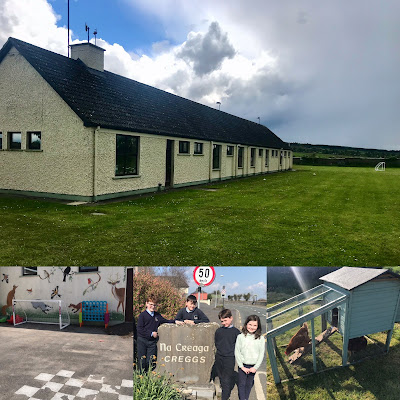COVID cut me off from what is one of the most enjoyable blessful elements of my work at the Insight Centre for Data Analytics NUI Galway, namely the opportunity to travel to every corner of Galway county and city in order to teach different aspects of technology in the schools that function as the heartbeat of their local communities.
This is particularly true of the little schools of rural Galway, which serve as the vibrant hub of their villages and parishes. The photo shows Creggs, one of these great primary schools located in the idyllic village that gives it its name and in which I spent a most enjoyable day last week teaching coding to the senior classes (being teaching there since 2006!).
In this period of rural decline it has been these learning institutions that have kept alive local traditions, such as making St. Bridget Crosses on February 1st; decorations and floats for St. Patrick’s Day; planting trees for Tree Week; painting festive eggs at Easter; and playing the songs and reciting the myths and legends of the locality in times past. As Irish people have abandoned farming (for work in the big city) and the great social gatherings that was the weekly Sunday only a few decades ago, it is the school that maintains a sense of ‘community spirit’ by bringing together the grannies, parents, cousins and neighbours of the pupils to enjoy concerts at Christmas, fancy dress parties at Samhain/Halloween, heritage nights, charity fundraising and group cycles. It is also the children of the school that are the life blood of the parish sports and youth clubs.
But these schools have been suffering for many decades due to creeping urbanisation. Fifty years ago Ireland's social and economic life revolved around an agricultural system based on the small family farm and rural towns were vibrant places serving their farming hinterland. Today too many of these country towns look like ghost towns with lines of abandoned and boarded up premises; the small family farm has lost its national economic centrality and the mosaic of fields of colourful wildflower meadows, barley, rye, oats, potatoes, cabbages and apple/damson/pear/orchards have all but disappeared from the landscape.
Depopulation in rural Ireland has led to many school closures including some that I worked in such as Corgary, Carnageehy and Woodlawn in east Galway. The car-based transport infrastructure assists this trend as it encourages some parents living in an increasingly suburban-orientated Irish countryside to understandably take children to schools near where they work in the big towns and cities.
But I now see the seeds for a resurgence in rural Ireland based on the principles of the Circular Economy characterised by mixed organic farming; the return of grain, vegetable and fruit growing in fields surrounded by hedgerows or drystone walls; a revitalisation of indigenous crafts and arts, the establishment of wildlife sanctuaries which includes deciduous forests, a network of interlinked greenways, an increased state committment towards public transport, an increased emphasis on renewable energies (wind, water, biomass), and a hospitality trade focused on sourcing locally grown foodstuffs.
The COVID lockdown has opened our eyes to the endless opportunities available with a proper broadband infrastructure allowing many to work long distance be if from homes or from the shared space of small town innovative digital hubs (some are set up already in what was until recently boarded up shops and pubs). Climate Change and Biodiversity Loss as well as the consequences of the destructive Russian invasion of Ukraine have shown us the crucial need to use local solutions to solve global crises. Sustainable jobs exist in nature guardianship, Outdoor Learning, Outdoor leisure (hiking, rowing, cycling etc), energy production, farming at so many levels, electronic repair/recycling/upcycling, biomedical manufacturing, education, crafts, arts, culture, scientific/technology research and green tourism. 3D printing, using safe recyclable materials, will mean the return of the 'cottage industry' to rural Ireland.
So it is crucial that the little country schools are now nurtured and kept open during this period of transition.
I have happily worked in these schools (and their second level ‘big brothers’) since 2002 teaching a range of science and technology courses (coding, film production, photo editing/enhancing, heritage, environmental science, data science, Citizen Science and Internet Safety) as well as offering teachers and children the opportunity to attend sessions at my university workplace to learn from my younger research colleagues, to visit my beloved computer museum as well as to exhibit at the annual Galway Science and Technology Festival Fair.

No comments:
Post a Comment